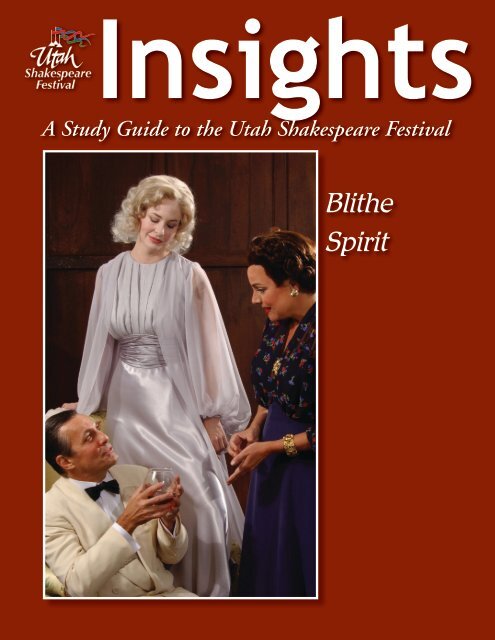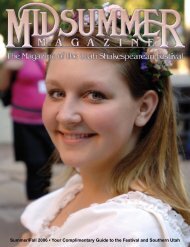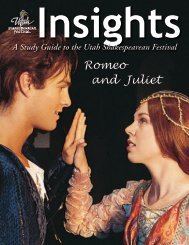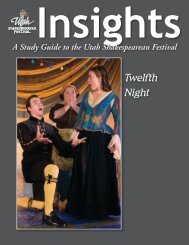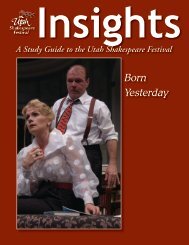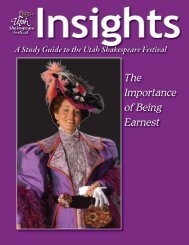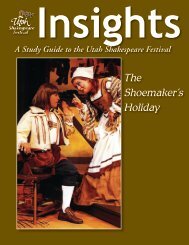View and print the complete guide in a pdf file. - Utah ...
View and print the complete guide in a pdf file. - Utah ...
View and print the complete guide in a pdf file. - Utah ...
- No tags were found...
You also want an ePaper? Increase the reach of your titles
YUMPU automatically turns print PDFs into web optimized ePapers that Google loves.
InsightsA Study Guide to <strong>the</strong> <strong>Utah</strong> Shakespeare FestivalBli<strong>the</strong>Spirit
The articles <strong>in</strong> this study <strong>guide</strong> are not meant to mirror or <strong>in</strong>terpret any productions at <strong>the</strong> <strong>Utah</strong> ShakespeareFestival. They are meant, <strong>in</strong>stead, to be an educational jump<strong>in</strong>g-off po<strong>in</strong>t to underst<strong>and</strong><strong>in</strong>g <strong>and</strong> enjoy<strong>in</strong>g <strong>the</strong> plays (<strong>in</strong>any production at any <strong>the</strong>atre) a bit more thoroughly. Therefore <strong>the</strong> stories of <strong>the</strong> plays <strong>and</strong> <strong>the</strong><strong>in</strong>terpretative articles (<strong>and</strong> even characters, at times) may differ dramatically from what is ultimately producedon <strong>the</strong> Festival’s stages.The Study Guide is published by <strong>the</strong> <strong>Utah</strong> Shakespeare Festival, 351 West Center Street; Cedar City, UT 84720.Bruce C. Lee, communications director <strong>and</strong> editor; Phil Hermansen, art director.Copyright © 2011, <strong>Utah</strong> Shakespeare Festival. Please feel free to download <strong>and</strong> <strong>pr<strong>in</strong>t</strong> The Study Guide, as long asyou do not remove any identify<strong>in</strong>g mark of <strong>the</strong> <strong>Utah</strong> Shakespeare Festival.For more <strong>in</strong>formation about Festival education programs:<strong>Utah</strong> Shakespeare Festival351 West Center StreetCedar City, <strong>Utah</strong> 84720435-586-7880www.bard.org.Cover photo: Arthur Hanket (left) as Charles, Stephanie Erb as Elvira, <strong>and</strong> Carole Healey as Ruth <strong>in</strong> Bli<strong>the</strong> Spirit, 2004
Bli<strong>the</strong> SpiritContentsInformation on <strong>the</strong> PlaySynopsis 4Characters 5About <strong>the</strong> Playwright 6Scholarly Articles on <strong>the</strong> PlayAn Improbable Farce 7Some Sort of Genius 9Noel Coward as <strong>the</strong> Mirror of a Generation 10<strong>Utah</strong> Shakespeare Festival351 West Center Street • Cedar City, <strong>Utah</strong> 84720 • 435-586-78803
Noel CowardNoel Pierce Coward was born on 16 December 1899. His family on his fa<strong>the</strong>r’s side wasvery talented musically, <strong>and</strong> <strong>the</strong>y helped nurture <strong>the</strong> natural virtuosity of <strong>the</strong> child, <strong>in</strong>still<strong>in</strong>g <strong>in</strong>him a lifelong love of music. Also, his mo<strong>the</strong>r took him to <strong>the</strong> <strong>the</strong>atre every year on his birthday,<strong>and</strong>, as he grew older, he found <strong>the</strong>se junkets more <strong>and</strong> more fasc<strong>in</strong>at<strong>in</strong>g <strong>and</strong> upon return<strong>in</strong>ghome would rush to <strong>the</strong> piano <strong>and</strong> play by ear <strong>the</strong> songs from <strong>the</strong> production he had justseen.He made his first public appearance, s<strong>in</strong>g<strong>in</strong>g <strong>and</strong> accompany<strong>in</strong>g himself on <strong>the</strong> piano, ata concert held at Miss Will<strong>in</strong>gton’s School. Though obviously a very talented child, Coward’sprecocity did not carry over to his formal education. At best, his school<strong>in</strong>g was sporadic. Hewas <strong>in</strong>dulged by his mo<strong>the</strong>r, who became <strong>the</strong> stereotypical stage mo<strong>the</strong>r dur<strong>in</strong>g his early years,<strong>and</strong> it was at his mo<strong>the</strong>r’s <strong>in</strong>sistence that he began attend<strong>in</strong>g Miss Janet Thomas’s Danc<strong>in</strong>gAcademy <strong>in</strong> addition to his regular school <strong>in</strong> London. Soon, Miss Thomas’s school usurped<strong>the</strong> position of importance held by traditional academic fare, <strong>and</strong> Coward became a child performer.Coward’s first professional engagement, <strong>and</strong> that which launched his long career, was on 27January 1911 <strong>in</strong> a children’s play, The Goldfish. After this appearance, he was sought after forchildren’s roles by o<strong>the</strong>r professional <strong>the</strong>atres. He was featured <strong>in</strong> several productions with SirCharles Hawtrey, a light comedian, whom Coward idolized <strong>and</strong> to whom he virtually apprenticedhimself until he was twenty. It was from Hawtrey that Coward learned comic act<strong>in</strong>g techniques<strong>and</strong> playwrit<strong>in</strong>g.At <strong>the</strong> tender age of twelve, Coward met one of <strong>the</strong> actresses who would help contributeto his overwhelm<strong>in</strong>g success, Gertrude Lawrence; she was <strong>the</strong>n fifteen <strong>and</strong> a child performeras well. The act<strong>in</strong>g team of Coward <strong>and</strong> Lawrence would become synonymous with polished,sophisticated comedy dur<strong>in</strong>g <strong>the</strong> 1920s, ‘30s, <strong>and</strong> ‘40s.Coward began his writ<strong>in</strong>g career when he was sixteen by writ<strong>in</strong>g songs <strong>and</strong> sell<strong>in</strong>g <strong>the</strong>mfor distribution. He turned his h<strong>and</strong> to playwrit<strong>in</strong>g when he was seventeen <strong>and</strong> found that hewas very good at writ<strong>in</strong>g dialogue. By 1919, his play I’ll Leave It to You was produced <strong>in</strong> <strong>the</strong>West End with Coward <strong>in</strong> <strong>the</strong> lead<strong>in</strong>g role. One of <strong>the</strong> idiosyncrasies of Coward’s writ<strong>in</strong>g isthat often he wrote “whack<strong>in</strong>g good parts” for himself or for people he knew. Some of his bestplays are essentially vehicles for his own talents or those of Gertrude Lawrence <strong>and</strong> later of <strong>the</strong>Lunts. I’ll Leave It to You met with moderate success, <strong>and</strong> Coward received great praise fromcritics for his play-writ<strong>in</strong>g abilities.Coward went to New York for <strong>the</strong> first time <strong>in</strong> 1921 <strong>and</strong> arrived virtually penniless;however, although he may have begun <strong>the</strong> 1920s <strong>in</strong> penury, his position as <strong>the</strong> most popularplaywright <strong>in</strong> <strong>the</strong> English <strong>the</strong>atre became secure dur<strong>in</strong>g this decade. In 1924, The Vortex,Coward’s most important serious play, was produced <strong>in</strong> London. The years from 1928 to 1934were regarded by many as Coward’s “golden years.” His str<strong>in</strong>g of successes <strong>in</strong>clude This Yearof Grace, Bitter Sweet, Private Lives, Cavalcade, Words <strong>and</strong> Music, Design for Liv<strong>in</strong>g, <strong>and</strong>Conversation Piece.In 1941 he wrote <strong>the</strong> record-break<strong>in</strong>g Bli<strong>the</strong> Spirit, which ran for 1,997 performances <strong>in</strong>London.After World War II, Coward fell from grace with many critics, who regarded him as be<strong>in</strong>gpast his literary prime. However, by <strong>the</strong> late 1950s, audiences were once aga<strong>in</strong> <strong>in</strong> love with him.His plays, revues, <strong>and</strong> nightclub appearances were extremely successful. The critics, however,rema<strong>in</strong>ed vitriolic, but <strong>the</strong>ir rancor failed to dim <strong>the</strong> enthusiasm of <strong>the</strong> general <strong>the</strong>atre-go<strong>in</strong>gpublic, which clamored for more Coward plays.6<strong>Utah</strong> Shakespeare Festival351 West Center Street • Cedar City, <strong>Utah</strong> 84720 • 435-586-7880
On January 1, 1970, Coward was honored by <strong>the</strong> queen as a knight bachelor for servicesrendered to <strong>the</strong> arts. In <strong>the</strong> same year, he was awarded a special Tony Award by <strong>the</strong> American<strong>the</strong>atre for dist<strong>in</strong>guished achievement <strong>in</strong> <strong>the</strong> <strong>the</strong>atre. In 1972, he received an honorary doctorof letters from <strong>the</strong> University of Sussex.Coward died of a heart attack <strong>in</strong> Jamaica on 26 March 1973, br<strong>in</strong>g<strong>in</strong>g to an end a career ofmore than sixty years <strong>in</strong> <strong>the</strong> <strong>the</strong>atre.Bli<strong>the</strong> Spirit:An Improbable FarceFrom Insights, 1992Noel Coward subtitled Bli<strong>the</strong> Spirit “an improbable farce,” <strong>and</strong> it is, not only because itasks <strong>the</strong> audience to believe <strong>in</strong> <strong>the</strong> supernatural but also because its humor turns on <strong>the</strong> ideathat <strong>the</strong> supernatural world has a pattern of manners much like ours.Suspend<strong>in</strong>g disbelief comes easily to audiences of this play. The playgoer knows from<strong>the</strong> open<strong>in</strong>g moments, when <strong>the</strong> Condom<strong>in</strong>es <strong>and</strong> Bradmans are so sure that ghosts cannotappear, that almost certa<strong>in</strong>ly someth<strong>in</strong>g will happen to prove <strong>the</strong>m wrong. Madame Arcati isa trustworthy l<strong>in</strong>k between “here” <strong>and</strong> “<strong>the</strong> o<strong>the</strong>r side”; she is so much more down-to-earth,for all of her clairvoyance <strong>and</strong> bizarre dress, than <strong>the</strong> ra<strong>the</strong>r superficial <strong>and</strong> over-sophisticatedCondom<strong>in</strong>es. She rides a bicycle, likes to eat, openly shows enthusiasm, <strong>and</strong> speaks <strong>in</strong> GirlScout clichés. If such a woman believes <strong>in</strong> ghosts, it would be very hard for a self-respect<strong>in</strong>gaudience not to play along. This belief is central to <strong>the</strong> play’s humor--<strong>the</strong> butts of <strong>the</strong> jokesoften are <strong>the</strong> foolish characters who refuse to believe <strong>in</strong> Elvira’s presence.Elvira is not merely a believable ghost, she is a ghost who pouts, teases, wh<strong>in</strong>es, manipulates--<strong>in</strong>short, does exactly what she did when alive. Elvira has not mellowed at all <strong>in</strong> <strong>the</strong> afterlife,which she describes as an extended cocktail party where she played chess with GenghisKhan <strong>and</strong> watched Merl<strong>in</strong> do magic tricks. Her jealousy of Charles <strong>and</strong> Ruth drives her f<strong>in</strong>allytoward murder <strong>in</strong> order to w<strong>in</strong> him back. Yet <strong>the</strong>re is not much to be feared from death (evenmurder) <strong>in</strong> this play. After all, life on <strong>the</strong> o<strong>the</strong>r side seems to be just like life here, only gray.Bli<strong>the</strong> Spirit is a farcical version of one of <strong>the</strong> staples of comedies of manners, <strong>the</strong> domesticdisagreement. The play h<strong>in</strong>ges on <strong>the</strong> triangle--husb<strong>and</strong> <strong>and</strong> lov<strong>in</strong>g wife separated by jealousformer wife (who happens to be dead). The playgoer wants <strong>the</strong>m to triumph, to banish Elvira<strong>and</strong> return to bliss--or does he? After all, with her spontaneity <strong>and</strong> love of liv<strong>in</strong>g, Elvira displaysconsiderable charm. Once Coward starts manipulat<strong>in</strong>g audience sympathy, it is a short step tocheer<strong>in</strong>g for <strong>the</strong> ghosts of Ruth <strong>and</strong> Elvira as <strong>the</strong>y try to beat Charles <strong>in</strong> <strong>the</strong> f<strong>in</strong>al act.Much of what makes this play so charm<strong>in</strong>g, however, are <strong>the</strong> effects that cannot be seen on<strong>the</strong> written page, but must be experienced on <strong>the</strong> stage. First are <strong>the</strong> stage tricks, such as <strong>the</strong>float<strong>in</strong>g bowl of flowers <strong>and</strong> <strong>the</strong> crash<strong>in</strong>g crockery <strong>and</strong> pictures <strong>in</strong> <strong>the</strong> f<strong>in</strong>al scene. Additionally,<strong>the</strong>re are some nice visual touches. Elvira is an ord<strong>in</strong>ary fashionable, sophisticated woman,made ghostly by be<strong>in</strong>g gray from head to toe. When Ruth dies, <strong>the</strong> effect doubles; now <strong>the</strong>reare two gray matrons compet<strong>in</strong>g for attention. However, <strong>the</strong> pr<strong>in</strong>cipal difference between read<strong>in</strong>g<strong>and</strong> see<strong>in</strong>g Bli<strong>the</strong> Spirit is <strong>in</strong> <strong>the</strong> comedic effect of overlapp<strong>in</strong>g simultaneous dialogue. On<strong>the</strong> page, <strong>the</strong> reader can follow only one speaker per l<strong>in</strong>e; on <strong>the</strong> stage, words are tennis balls<strong>Utah</strong> Shakespeare Festival351 West Center Street • Cedar City, <strong>Utah</strong> 84720 • 435-586-78807
e<strong>in</strong>g flung from person to person, tossed above heads <strong>and</strong> below belts.In fact, most of <strong>the</strong> humor <strong>in</strong> Bli<strong>the</strong> Spirit turns on <strong>the</strong> question, who knows <strong>the</strong> most? Theaudience <strong>and</strong> <strong>the</strong> Condom<strong>in</strong>es beg<strong>in</strong> on <strong>the</strong> same level, educated <strong>and</strong> worldly <strong>and</strong> conv<strong>in</strong>ced thatall this spiritual bus<strong>in</strong>ess is nonsense. Then <strong>the</strong> level of awareness shifts, with <strong>the</strong> audience <strong>and</strong>Charles jo<strong>in</strong><strong>in</strong>g Madame Arcati <strong>in</strong> know<strong>in</strong>g that ghosts exist, <strong>and</strong> Ruth’s skepticism now makesher <strong>the</strong> foolish one. Then <strong>the</strong>re is ano<strong>the</strong>r shift--Charles <strong>and</strong> Ruth know about Elvira <strong>and</strong> attemptto conceal <strong>the</strong>ir knowledge from <strong>the</strong> Bradmans. Toward <strong>the</strong> end, Charles, Ruth, Elvira, <strong>and</strong> <strong>the</strong>audience know even more than Madame Arcati about ghosts <strong>and</strong> <strong>the</strong>ir behavior. These chang<strong>in</strong>glevels of awareness keep <strong>the</strong> farce from fall<strong>in</strong>g flat after <strong>the</strong> first scene or two of miscommunicationbetween <strong>the</strong> real world <strong>and</strong> <strong>the</strong> o<strong>the</strong>r side; nobody, especially <strong>the</strong> playgoer, can be quite sure ofwhat he knows.Bli<strong>the</strong> Spirit:Some Sort of GeniusBy Susan E. Gunter8<strong>Utah</strong> Shakespeare Festival351 West Center Street • Cedar City, <strong>Utah</strong> 84720 • 435-586-7880
From Souvenir Program, 1992In his autobiography, Future Indef<strong>in</strong>ite, Noel Coward says that he <strong>complete</strong>d Bli<strong>the</strong> Spirit<strong>in</strong> six days: “When <strong>the</strong> right note is struck <strong>and</strong> <strong>the</strong> structure of a play is carefully built <strong>in</strong>advance, it is both wise <strong>and</strong> profitable to start at <strong>the</strong> beg<strong>in</strong>n<strong>in</strong>g <strong>and</strong> write through to <strong>the</strong> end<strong>in</strong> as short a time as possible.” Coward had <strong>in</strong>deed struck <strong>the</strong> right note. Bli<strong>the</strong> Spirit openedon July 2, 1941, <strong>in</strong> <strong>the</strong> Piccadilly Theatre <strong>in</strong> London <strong>and</strong> became an <strong>in</strong>stant <strong>and</strong> overwhelm<strong>in</strong>gsuccess. The play ran for a record-sett<strong>in</strong>g four <strong>and</strong> one-half years (1,997 performances). Perhaps<strong>the</strong> play represented Coward’s gift to a war-weary nation. On open<strong>in</strong>g night <strong>the</strong> audiencewalked across planks laid over <strong>the</strong> debris from a recent air raid to enter <strong>the</strong> fanciful ghost-riddenworld that Coward had created, a world he himself said was “on a plane just above reality.”Bli<strong>the</strong> Spirit opens with a mature, sophisticated married couple, Charles <strong>and</strong> RuthCondom<strong>in</strong>e, who live rational <strong>and</strong> orderly lives <strong>in</strong> <strong>the</strong> English countryside near Kent. WriterCharles, who is beg<strong>in</strong>n<strong>in</strong>g a new novel called The Unseen (one of <strong>the</strong> play’s many small ironies),has asked medium Madame Arcati to come to <strong>the</strong>ir home <strong>and</strong> conduct a séance as partof his “research” for <strong>the</strong> book. Madame Arcati, a delightful character who goes everywhereon her bicycle <strong>and</strong> has most recently written a children’s book featur<strong>in</strong>g a moss beetle as hero,challenges all of <strong>the</strong> Condom<strong>in</strong>es’ rational assumptions concern<strong>in</strong>g reality <strong>in</strong> a draw<strong>in</strong>g roomcomedy of <strong>the</strong> highest order.Madame Arcati, us<strong>in</strong>g as her control a child named Daphne, proceeds <strong>in</strong> her séance to callup <strong>the</strong> ghost (“protoplasmic manifestation”) of Charles’s first wife, Elvira, who has been deadfor seven years. As <strong>the</strong> gramophone plays <strong>the</strong> tune, “Always,” <strong>the</strong> table bangs about, MadameArcati screams <strong>and</strong> falls from her stool, <strong>and</strong> Charles hears a ghostly voice.Elvira, whose flamboyant <strong>and</strong> irreverent personality contrasts markedly with Ruth’s sensible,efficient nature, can be seen <strong>and</strong> heard by Charles but no one else. Much of <strong>the</strong> play’s subsequentwry humor turns on <strong>the</strong> device of double mean<strong>in</strong>gs: Charles’s remarks to <strong>the</strong> ghostlyElvira are heard <strong>and</strong> misunderstood by Ruth, provid<strong>in</strong>g <strong>in</strong> effect a dramatic <strong>and</strong> exaggeratedillustration of how married couples often fail to communicate to one ano<strong>the</strong>r. Ruth, at firstskeptical of Elvira’s “reality,” seeks formulaic explanations for Charles’s odd behavior, attribut<strong>in</strong>ghis strange remarks to too much alcohol or a nervous breakdown.Elvira’s bli<strong>the</strong> attitude counterpo<strong>in</strong>ts Ruth’s stolidness, <strong>and</strong> even Madame Arcati, who whencalled back to <strong>the</strong> house later refuses to try to recall Elvira because she has just eaten pigeon pie<strong>and</strong> cucumber s<strong>and</strong>wiches for lunch, tells Ruth that, “<strong>the</strong>re are more th<strong>in</strong>gs <strong>in</strong> heaven <strong>and</strong> earththan are dreamt of <strong>in</strong> your philosophy, Mrs. Condom<strong>in</strong>e.”As Elvira’s “bli<strong>the</strong> spirit” turns bad, however, <strong>the</strong> audience must be will<strong>in</strong>g to suspenddisbelief <strong>and</strong> accept <strong>the</strong> play’s ghostly conventions. Elvira upsets <strong>the</strong> balance that Charles <strong>and</strong>Ruth have created <strong>in</strong> <strong>the</strong>ir relationship, mak<strong>in</strong>g <strong>the</strong>m realize that <strong>the</strong>ir rules of conduct do notapply <strong>in</strong> <strong>the</strong> larger context of <strong>the</strong> unexpla<strong>in</strong>able mysteries of life <strong>and</strong> death, as Coward’s farcicalplott<strong>in</strong>g <strong>and</strong> witty dialogue comb<strong>in</strong>e to produce a technically skillful play that has enterta<strong>in</strong>edaudiences for over four decades.Bli<strong>the</strong> Spirit:Noel Coward as <strong>the</strong> Mirror of aGenerationBy Lynnette L. Horner<strong>Utah</strong> Shakespeare Festival351 West Center Street • Cedar City, <strong>Utah</strong> 84720 • 435-586-78809
From Insights, 2004“I will ever be grateful for <strong>the</strong> almost psychic gift than enabled me to write Bli<strong>the</strong> Spirit <strong>in</strong> five daysdur<strong>in</strong>g one of <strong>the</strong> darkest years of <strong>the</strong> war” (Noël Coward, quoted at Methuen, “Bli<strong>the</strong> Spirit by NoëlCoward,” http://www.methuen.co.uk/bli<strong>the</strong>spirit.html (accessed 8 April 2004). Written <strong>and</strong> produced <strong>in</strong><strong>the</strong> thick of World War II <strong>in</strong> 1941, one might ask <strong>the</strong> question, what was <strong>the</strong>re about that time <strong>and</strong> placethat would <strong>in</strong>spire <strong>the</strong> creation of one of <strong>the</strong> most popular <strong>and</strong> long-runn<strong>in</strong>g comedies; “an improbablefarce <strong>in</strong> three acts”? What chord did it strike <strong>in</strong> audiences that were for <strong>the</strong> second time liv<strong>in</strong>g through<strong>the</strong> drear<strong>in</strong>ess of black outs, air raids, ration<strong>in</strong>g, <strong>and</strong> <strong>the</strong> heartbreak<strong>in</strong>g casualty lists caused by war foughton home soil?A look back to <strong>the</strong> author’s beg<strong>in</strong>n<strong>in</strong>gs may give us some <strong>in</strong>sight. Noël Coward was born <strong>in</strong>December 1899, <strong>and</strong> thus, was <strong>in</strong> <strong>the</strong> <strong>in</strong>terest<strong>in</strong>g position of grow<strong>in</strong>g up with a new century. Born tomiddle class parents of no small musical talent, Coward was weaned on amateur <strong>and</strong> professional <strong>the</strong>atricalproductions. His fa<strong>the</strong>r, a piano salesman, was very good at musical improvisation, <strong>and</strong> Coward followed<strong>in</strong> his fa<strong>the</strong>r’s footsteps. Nurtured <strong>in</strong> this atmosphere, he was <strong>in</strong> constant dem<strong>and</strong> to perform, first,on his home turf <strong>and</strong> <strong>the</strong>n <strong>in</strong> amateur productions. An avid observer of people, Coward developed <strong>the</strong>talent of pick<strong>in</strong>g up <strong>the</strong> eccentric nuances <strong>in</strong> people that made <strong>in</strong>terest<strong>in</strong>g characters who translated wellto <strong>the</strong> stage <strong>and</strong> screen. And whereas some of his contemporaries dramatized <strong>the</strong> deep <strong>and</strong> hard aspects oflife evolv<strong>in</strong>g through <strong>the</strong> <strong>in</strong>dustrial age, he chose to orbit <strong>in</strong> social circles that were <strong>the</strong> epitome of glamour,many times frivolous with a t<strong>in</strong>ge of cynicism. In large measure, Coward’s life, experience, <strong>and</strong> careermirrored <strong>the</strong> birth of a century <strong>and</strong> <strong>the</strong> grow<strong>in</strong>g pa<strong>in</strong>s of a generation.At <strong>the</strong> tender age of ten, Coward conv<strong>in</strong>ced his mo<strong>the</strong>r to answer an advertisement announc<strong>in</strong>g <strong>the</strong>audition for young boys to be part of a prestigious children’s <strong>the</strong>atrical group. Of <strong>the</strong> hundreds of letterssubmitted, <strong>the</strong>re was someth<strong>in</strong>g <strong>in</strong> Noël’s mo<strong>the</strong>r’s letter that piqued <strong>in</strong>terest, <strong>and</strong> Noël was <strong>in</strong>vitedto audition. His natural charm <strong>and</strong> stage presence was apparent <strong>and</strong> his young feet were firmly plantedon his life’s course as he jo<strong>in</strong>ed his new <strong>the</strong>atre family. Dur<strong>in</strong>g this time, he made friends with a youngGertrude Lawrence who became a lifetime co-star <strong>and</strong> dear friend. He also befriended ano<strong>the</strong>r youngactress, Esme Wynne, who later became a successful novelist <strong>and</strong> <strong>in</strong>spired Noël to add writ<strong>in</strong>g to his listof talents.As a young eighteen-year-old, drunk with his success on <strong>the</strong> stage <strong>and</strong> full of high, youthful ambitions,Noël had not felt much impact from World War I. But, <strong>in</strong> 1918, he was called up <strong>and</strong>, althoughfound physically unfit for active service, was assigned to serve n<strong>in</strong>e months <strong>in</strong> <strong>the</strong> Artists Rifles. He wasmiserable with this <strong>in</strong>terruption <strong>in</strong> his career. By <strong>the</strong> time he entered <strong>the</strong> war, Engl<strong>and</strong> was well past <strong>the</strong>glamour of patriotism <strong>and</strong> was tired of <strong>the</strong> ration<strong>in</strong>g, black outs, <strong>and</strong> general misery <strong>the</strong> war brought to<strong>the</strong>ir shores.In some measure, it was a response of escapism from <strong>the</strong> wear<strong>in</strong>ess of war that <strong>in</strong>spired <strong>the</strong> spectacleproductions that were spun sugar, superficial <strong>and</strong> with a dash of cynicism that characterized <strong>the</strong> 1920sera. Coward was <strong>in</strong> <strong>the</strong> thick of it <strong>and</strong> whe<strong>the</strong>r he simply mirrored social mores of <strong>the</strong> time, or as somecriticized, created <strong>the</strong>m, his plays dur<strong>in</strong>g <strong>the</strong> twenties were considered sometimes immoral <strong>and</strong> shock<strong>in</strong>g.They were wildly popular. A commentary of <strong>the</strong> open<strong>in</strong>g night of The Vortex on his twenty-sixth birthdayacknowledges <strong>the</strong> “which came first” argument of whe<strong>the</strong>r art imitates life or vice verse.“Noël’s first nights had already atta<strong>in</strong>ed fever-pitch of excitement <strong>the</strong>y were never to lose. Celebritiespredom<strong>in</strong>ated: film <strong>and</strong> stage stars, usually one or two members of <strong>the</strong> Royal family, <strong>and</strong> socialitesgalore with <strong>the</strong>ir concomitant Rolls Royces, furs <strong>and</strong> jewels. They were beg<strong>in</strong>n<strong>in</strong>g to talk a language of<strong>the</strong>ir own: St. John Erv<strong>in</strong>e had already compla<strong>in</strong>ed at hav<strong>in</strong>g to sit next to a litter of <strong>the</strong>m with <strong>the</strong>ir‘too div<strong>in</strong>e’ <strong>and</strong> ‘simply marvelous darl<strong>in</strong>gs’. Whe<strong>the</strong>r <strong>the</strong> bright young th<strong>in</strong>gs were try<strong>in</strong>g to copy Noël’scharacters, who Mrs. Patrick Campbell said ‘talked like typewrit<strong>in</strong>g’, or whe<strong>the</strong>r Noël was hold<strong>in</strong>g up <strong>the</strong>mirror to <strong>the</strong> socialites is not easy to decide, but one may suspect that it was <strong>the</strong> former” (Cole Lesley,10<strong>Utah</strong> Shakespeare Festival351 West Center Street • Cedar City, <strong>Utah</strong> 84720 • 435-586-7880
Graham Payn, <strong>and</strong> Sheridan Morely, Noël Coward <strong>and</strong> His Friends [New York: William Morrow<strong>and</strong> Company, Inc., 1979], 58).Fast forward through <strong>the</strong> thirties dur<strong>in</strong>g which time, Coward cont<strong>in</strong>ued act<strong>in</strong>g, produc<strong>in</strong>g, writ<strong>in</strong>g,<strong>and</strong> s<strong>in</strong>g<strong>in</strong>g on both sides of <strong>the</strong> Atlantic. To America he brought his signature br<strong>and</strong> of sophisticatedcomedy. The United States repaid <strong>the</strong> favor by <strong>in</strong>fus<strong>in</strong>g his work with pac<strong>in</strong>g <strong>and</strong> energy, notcommon before <strong>in</strong> British <strong>the</strong>atre.Coward’s maturity is also apparent <strong>in</strong> his political <strong>in</strong>terest <strong>and</strong> <strong>in</strong>volvement <strong>in</strong> <strong>the</strong> historicalevents lead<strong>in</strong>g to World War II. In stark contrast from his eighteen-year-old annoyance at World WarI <strong>in</strong>terrupt<strong>in</strong>g his o<strong>the</strong>rwise idyllic lifestyle, Coward was a passionate vocal opponent of <strong>the</strong> policyof appeasement that led to World War II. His desire was to take an active, significant role dur<strong>in</strong>g<strong>the</strong> war, <strong>and</strong> for a short time worked for British propag<strong>and</strong>a <strong>in</strong> Paris. He had hoped this would leadto an official war job work<strong>in</strong>g with <strong>the</strong> Navy. Because of Coward’s high pro<strong>file</strong> persona, W<strong>in</strong>stonChurchill was opposed to it. It was decided <strong>the</strong> greatest part he could play would be to enterta<strong>in</strong> <strong>the</strong>troops <strong>and</strong> spent many of <strong>the</strong> war years spann<strong>in</strong>g <strong>the</strong> globe, to Africa, Europe, <strong>and</strong> India (Lesley, 132133).In 1941, Brita<strong>in</strong> was aga<strong>in</strong> war weary <strong>and</strong> <strong>the</strong> toll of death <strong>and</strong> loss touched every level of society.The spiritualist movement (<strong>the</strong> belief that <strong>the</strong> dead can communicate with <strong>the</strong> liv<strong>in</strong>g througha medium) had crossed <strong>the</strong> Atlantic from America <strong>and</strong> had had four decades to l<strong>in</strong>e up its believers<strong>and</strong> debunkers. Coward, ever <strong>in</strong> tune with societal undercurrents, spun a tale <strong>in</strong> Bli<strong>the</strong> Spirit that isan escape from <strong>the</strong> horror of war, yet deals with its most terrible cost, death, with a light h<strong>and</strong>. Hedeftly wove this with a poke at cynicism <strong>and</strong> <strong>the</strong> sublim<strong>in</strong>al suggestion of “be careful what you askfor.”Noël Coward’s public responded <strong>and</strong>, “Bli<strong>the</strong> Spirit rema<strong>in</strong>ed <strong>the</strong> longest runn<strong>in</strong>g comedy <strong>in</strong>British <strong>the</strong>atre for three decades” (Methuen). The irresistible comb<strong>in</strong>ation of urbane humor, <strong>in</strong>trigu<strong>in</strong>gcharacters, <strong>and</strong> enough surprise to keep th<strong>in</strong>gs <strong>in</strong>terest<strong>in</strong>g still delights as Bli<strong>the</strong> Spirit cont<strong>in</strong>uesto delight today’s audiences as it did half a century ago.<strong>Utah</strong> Shakespeare Festival351 West Center Street • Cedar City, <strong>Utah</strong> 84720 • 435-586-788011


